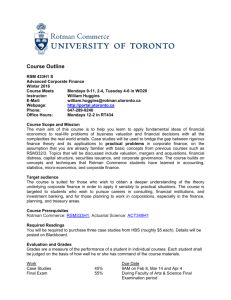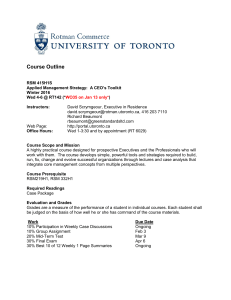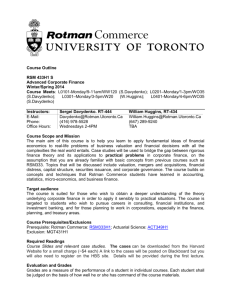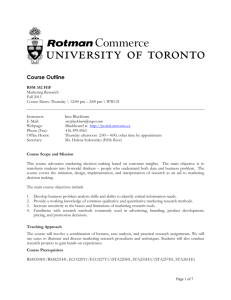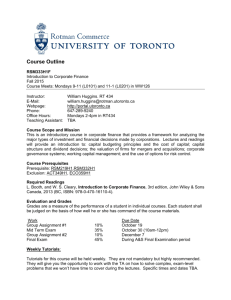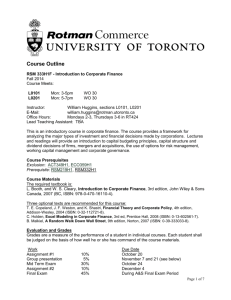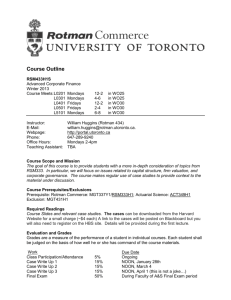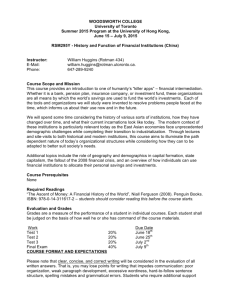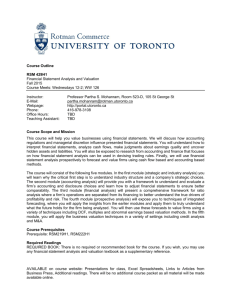RSM 222H1F - Management Accounting I
advertisement
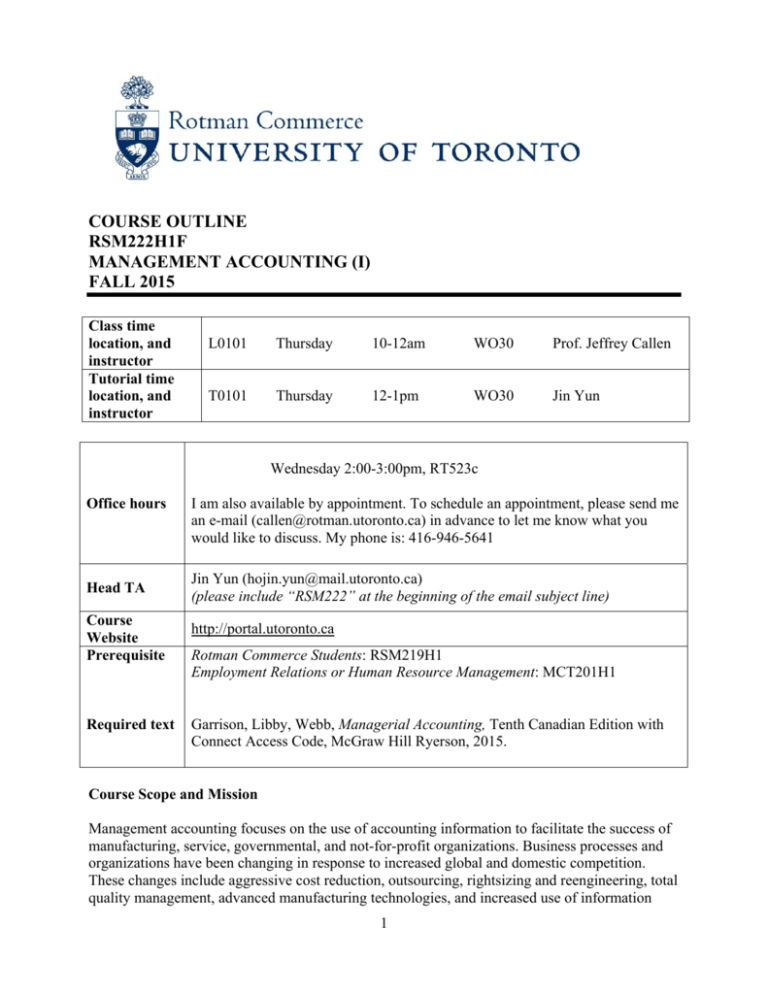
COURSE OUTLINE RSM222H1F MANAGEMENT ACCOUNTING (I) FALL 2015 Class time location, and instructor Tutorial time location, and instructor L0101 Thursday 10-12am WO30 Prof. Jeffrey Callen T0101 Thursday 12-1pm WO30 Jin Yun Wednesday 2:00-3:00pm, RT523c Office hours Head TA Course Website Prerequisite Required text I am also available by appointment. To schedule an appointment, please send me an e-mail (callen@rotman.utoronto.ca) in advance to let me know what you would like to discuss. My phone is: 416-946-5641 Jin Yun (hojin.yun@mail.utoronto.ca) (please include “RSM222” at the beginning of the email subject line) http://portal.utoronto.ca Rotman Commerce Students: RSM219H1 Employment Relations or Human Resource Management: MCT201H1 Garrison, Libby, Webb, Managerial Accounting, Tenth Canadian Edition with Connect Access Code, McGraw Hill Ryerson, 2015. Course Scope and Mission Management accounting focuses on the use of accounting information to facilitate the success of manufacturing, service, governmental, and not-for-profit organizations. Business processes and organizations have been changing in response to increased global and domestic competition. These changes include aggressive cost reduction, outsourcing, rightsizing and reengineering, total quality management, advanced manufacturing technologies, and increased use of information 1 technologies. As a result, management accountants play a strategic role in developing and presenting both financial and non-financial information that is critical for the organization’s success. The primary objective of this course is to enable you to make effective use of management accounting data. A secondary objective is to develop the analytical skills necessary to diagnose complex business problems in accounting context. You will study how accounting information can be used intelligently to make business decisions in a global business environment. The world of management accounting is dynamic, and you will combine the study of traditional concepts and techniques with that of the most recent advances in management accounting. The course is designed to help you understand the concepts and applications of cost management principles, and to provide an opportunity for you to develop skills in applying these principles through exercises and cases. Evaluation and Grades Homework Midterm test Group project Final exam Total Thurs Oct 29, 10:00am-12:00pm See the description below During final examination period 10% 30% 15% 45% 100% Course Requirements and Expectations Homework You are required to complete homework for the chapter(s) covered following the lecture. The homework must be completed individually. Homework will be accessed through Connect and will be available on Thursday’s at 2pm, and due the following Wednesday at 2pm. There will be 11 homework chapters in total (Chapters 2-12). Your lowest score will be dropped. Details on how to register for the Connect course will be provided on Blackboard. Term Test The term test will be held on Thursday October 29 from 10:00 am to 12:00 pm. It will be an hour and fifty minutes long and will consist of multiple choice questions, short answer questions, and problems. The term test will cover material from Class 1 to 6, inclusive. Aids Allowed No study aids are allowed. You may use a non-programmable hand-held calculator. Absence from the test Students who miss a test or assignment for reasons entirely beyond their control (e.g. illness) may submit a request for special consideration. Provided that notification and documentation are 2 provided in a timely manner, and that the request is subsequently approved, no academic penalty will be applied. In such cases, students must notify Rotman Commerce on the date of the missed test (or due date in the case of course work) and submit supporting documentation (e.g. Verification of Student Illness or Injury form) to the Rotman Commerce Program Office within 48 hours of the originally scheduled test or due date. Students who do not provide Rotman Commerce or the instructor with appropriate or sufficient supporting documentation will be given a grade of 0 (zero) for the missed test or course deliverable. Note that the physician’s report must establish that the patient was examined and diagnosed at the time of illness, not after the fact. Rotman Commerce will not accept a statement that merely confirms a report of illness made by the student and documented by the physician. The students who follow the above procedures will have their marks reallocated to the final exam (75%). Failure to do so will result in a grade of zero. There will be no make-up term test. Group Case Assignment Students will be randomly organized into groups of four or five. The group project and instructions will be distributed after the term test. The assignment is due at11:00PM on Friday December 4th. The assignment should be submitted through both blackboard and turnitin.com. To Use Turnitin.com Students will be required to submit the group assignment to Turnitin.com for a review of textual similarity and detection of possible plagiarism. In doing so, students will allow their project to be included as source documents in the Turnitin.com reference database, where they will be used solely for the purpose of detecting plagiarism. The terms that apply to the university’s use of the Turnitin.com service are described on the Turnitin.com website. Late assignments Late assignments will not be accepted under any circumstance, and will be assigned a grade of zero. Independent group work All work is to be performed exclusively by the members of the group and all group members must contribute their fair share to each assignment. The instructor should be informed immediately if any group member is perceived not to be contributing their fair share. Your assignment is not to be shared with any student who is not a member of your group. Group Work Learning to work together in teams is an important aspect of your education and preparation for your future careers. That said, project-based teamwork is often new to students; to work well in teams, it helps to follow a set of core expectations to best succeed at your team projects. 1. Read the document entitled, “Working in Teams: Guidelines for Rotman Commerce Students” which is available on the RC portal under the Academic Services tab. 3 2. When working in a team, Rotman Commerce students are expected to: Treat other members with courtesy and respect; Honour the ground rules established by the team; Contribute substantially and proportionally to the final project; Ensure enough familiarity with the entire contents of the group project/assignment so as to be able to sign off on it as original work; Meet the project timeline as established by the team. 3. Resolving conflicts: Conflicts are part of the team’s process of learning how to work together. When handled well, it can generate creativity and bring-multiple perspectives to the solution. Student teams are expected to work through their misunderstandings as soon as they arise (and prior to submission of the final project). When teams are unable to arrive at a solution that works for all members, the team must meet with the Rotman Commerce Team Coach** as soon as possible. The Coach will listen to the team and help develop options for improving the team process. All members of the project team must commit to, and, utilize their action plans. ** For an appointment with a Rotman Commerce Team Coach, please contact Elaine Zapotoczny at elaine@nikoletaandassociates.com. Elaine is highly skilled at facilitating team dynamics and collaboration. Note that the Team Coach’s role is to provide guidance, support and advice on team matters – not to formally evaluate or assess teamwork for academic purposes. Final Examination The final examination will be held during the formal examination period. It will be three hours in duration and will consist of multiple choice questions, short answer questions, problems, and a case. It will cover all materials from the entire course. Aids Allowed No study aids are allowed. You may use a non-programmable hand-held calculator. ACCESSIBILITY NEEDS The University of Toronto is committed to accessibility. If you require accommodations for a disability, or have any accessibility concerns about the course, the classroom or course materials, please contact Accessibility Services as soon as possible: disability.services@utoronto.ca or http://www.accessibility.utoronto.ca/. ACADEMIC INTEGRITY Academic Integrity is a fundamental value essential to the pursuit of learning and scholarships at the University of Toronto. Participating honestly, respectively, responsibly, and fairly in this academic community ensures that the UofT degree that you earn will continue to be valued and respected as a true signifier of a student's individual work and academic achievement. As a result, the University treats cases of academic misconduct very seriously. 4 The University of Toronto’s Code of Behaviour on Academic Matters http://www.governingcouncil.utoronto.ca/policies/behaveac.htm outlines the behaviours that constitute academic misconduct, the process for addressing academic offences, and the penalties that may be imposed. You are expected to be familiar with the contents of this document. Potential offences include, but are not limited to: In papers and assignments: Using someone else's ideas or words without appropriate acknowledgement. Submitting your own work in more than one course without the permission of the instructor. Making up sources or facts. Obtaining or providing unauthorized assistance on any assignment (this includes collaborating with others on assignments that are supposed to be completed individually). On test and exams: Using or possessing any unauthorized aid, including a cell phone. Looking at someone else's answers Misrepresenting your identity. Submitting an altered test for re-grading. Misrepresentation: Falsifying institutional documents or grades. Falsifying or altering any documentation required by the University, including (but not limited to), medical notes. All suspected cases of academic dishonesty will be investigated by the following procedures outlined in the Code of Behaviour on Academic Matters. If you have any question about what is or not is permitted in the course, please do not hesitate to contact the course instructor. If you have any questions about appropriate research and citation methods, you are expected to seek out additional information from the instructor or other UofT resources such as College Writing Centres or the Academic Success Centre. EMAIL At times, the course instructor may decide to communicate important course information by email. As such, all UofT students are required to have a valid UTmail+ email address. You are responsible for ensuring that your UTmail+ email address is set up AND properly entered on the ROSI system. For more information please visit http://help.ic.utoronto.ca/category/3/utmail.html Forwarding your utoronto.ca email to a Hotmail, Gmail, Yahoo or other type of email account is not advisable. In some cases, messages from utoronto.ca addresses sent to Hotmail, Gmail or Yahoo accounts are filtered as junk mail, which means that important messages from your course instructor may end up in your spam or junk mail folder. 5 BLACKBOARD AND THE COURSE PAGE The online course page for this course is accessed through Blackboard. To access the course page, go to the UofT Portal login at https://portal.utoronto.ca/ and log in using your UTORid and password. Once you have logged in, look for the My Courses module where you’ll find the link to all your course websites. If you don’t see the course listed here but you are properly registered for the course in ROSI, wait 48 hours. If the course does not appear, go to the Information Commons Help Desk in Robarts Library, 1st floor, for help, or explore the Portal Information and Help at www.portalinfo.utoronto.ca/students and review the Frequently Asked Questions. RECORDING LECTURES Lectures and course materials prepared by the instructor are considered by the University to be an instructor’s intellectual property covered by the Canadian Copyright Act. Students wishing to record a lecture or other course materials in any way are required to ask the instructor’s explicit permission, and may not do so unless permission is granted (note: students who have been previously granted permission to record lectures as an accommodation for a disability are, of course, excepted). This includes tape recording, filming, photographing PowerPoint slides, blackboard materials, etc. CONDUCT OF CLASSES AND EXPECTATIONS Classes will begin at ten minutes after the hour, in accordance with university policy. Students are expected to arrive on time so as not to disrupt the class. 6 TENTATIVE COURSE OUTLINE* Class Date 1 Sept. 17 2 Sept. 24 3 Oct. 1 4 Oct. 8 5 Oct. 15 6 Oct. 22 Oct. 29 Topic Readings Management Accounting and Business Environment & Course Overview Cost Concepts, Cost Behaviour, and Cost Flows, Job-Order Costing Chapter 1 Chapters 2 and 3 Chapter 5 Homework / Assignment Connect Quiz Chapters 2 and 3 Connect Quiz Chapter 5 Connect Quiz Chapters 6 and 7 Connect Quiz Chapter 4 Connect Quiz Chapter 8 Process Costing and ActivityChapters 6 and 7 Based Costing Cost-Volume-Profit Analysis Chapter 4 (CVP) CVP Case Chapter 8 Variable Costing Term Test (10:00am-12:00pm, Thursday October 29, Galbraith Building Room 404) (Last day to drop course without academy penalty is Nov 8, 2015) Budgeting Chapter 9 Connect Quiz Chapter 6 Flexible Budget and Standard Chapter 10 Costing (I) 7 Nov. 5 8 Nov. 12 9 Nov. 19 Standard Costing (II) Chapter 10 10 Nov. 26 Relevant Costs & Decision Making Chapter 12 11 Dec. 3 Reporting for Control Chapter 11 * Homework assignments for each topic will be announced in class. 7 Connect Quiz Chapter 10 Connect Quiz Chapter 12 Group Project due Dec 4 @11pm Connect Quiz Chapter 11
